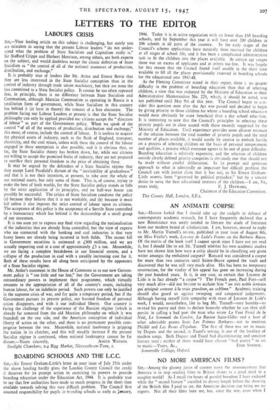BOARDING SCHOOLS AND THE L.C.C.
Sut,—Sir Ernest Graham-Little's letter in your issue of July 25th under the above heading hardly gives the London County Council the credit it deserves for its prompt action in exercising its powers to provide boarding education under the Education Act, 1944. It is probably true to say that few authorities have made so much progress in the short time available towards solving this very difficult problem. The Council first assumed responsibility for pupils in bearding schools as early as ;estuary, 1946. Today it is in active negotiation with no fewer than 150 boarding schools, and by September this year it will have over 200 children in 106 schools in all parts of the country. In the early stages of the Council's scheme applications have naturally been received for children at all stages of school life, and it has been a complicated administrative task to fit the children into the places available. At certain age ranges there was an excess of applicants and at others too few. It was largely for this reason that the Council found itself unable in the short time available to fill all the places provisionally reserved in boarding schools for the educational year 1947-48.
As the Fleming Committee stated in their report, there a no greater difficulty in the problem of boarding education than that of selecting children, a view that was endorsed by the Ministry of Education in their Administrative Memorandum No. 225, which, it should be noted, was not published until May 9th of this year. The Council began to ccn- sider this question soon after the Act was passed and decided to begin by giving priority to those children for whom a boarding school educatxn would most obviously be more beneficial than a day school educ-tion. It is interesting to note that the Council's principles in selecting these priority pupils are in close accord with those recently suggested by the Ministry of Education. Until experience provides some all-over estimate of the relation between the total number of priority pupils and the total number of places available, it would surely be unwise to embark ha'tily on a process of selecting children on the basis of personal temperament and qualities, a process which everyone agrees to be one of great difficulty. Boarding education is relatively expensive, and the selection of children outside clearly defined priority categories is obviously one that should not be made without careful deliberation. In its prompt and generous approach to what is admittedly an important but difficult problem the Council can with justice claim that it has not, as Sir Ernest Graham- Little asserts, been "governed by political prejudice," but by a sincere desire to serve the best educational interests of the children.—I am, Sir, Chairman of the Education Committee. The County Hall, London, S.E.r.


































 Previous page
Previous page